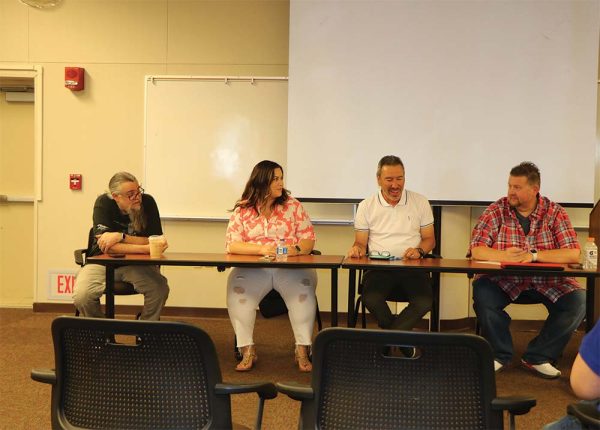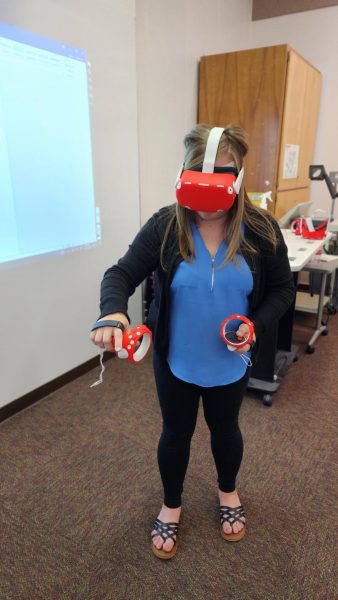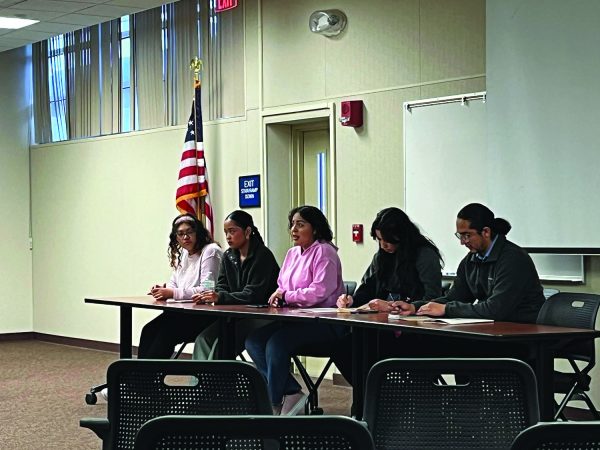Program gives Dreamers support
April 5, 2016
Bakersfield College Dreamers is not only a program on our campus but it is also a collective of “undocumented” students represented on campus. Led by Anna Poetker, philosophy professor, and Jeannie Parent, English for multilingual students department chair, the program provides information and guidance for students who feel pressured by the stigma of being an undocumented student.
Poetker said, “In 2011-2012, Jeanie and I saw a gap and wanted to help close it.”
Parent and Poetker held monthly meetings, but with the undocumented students’ circumstances, they realized that this was not the best way to reach them. That’s when the idea for the BC Dreamers website came to mind, where everything they would have discussed at a meeting could be posted online. It used to be more involved, such as when new information was passed on like the BOG waiver, but now it’s slowed down. This made it harder to update until it got linked to the BC homepage.
Poetker also said, “When we were doing meetings, we’d put up flyers, but now it’s word of mouth or I would email them any information. Since the website’s progress, I don’t have any idea as to how many Dreamers see it and don’t contact me because the website has everything.”
In 2012, DACA (Deferred Action for Childhood Arrivals) changed undocumented students’ eligibility for financial aid. This provides temporary relief from deportation, but it doesn’t extend to family. It also follows strict guidelines such as:
The student has to have been in the U.S. before the age of 15, have graduated from high school or completed their GED, have no criminal record, and been living in the US as of Jun. 30 2012. In return for meeting the criteria, students receive a legal working permit, a Social Security number, and a driver’s license.
There is a real risk of deportation and being discriminated against within the student culture that seems to be underground. Individuals feel as though they can’t expose themselves as undocumented students. They don’t know if it’s safe, but with DACA students have said there’s been a shift in this student underground that has come with this temporary protection. Even with this progress, some are still tentative and test the waters to know if it’s safe to confide in others on campus.
Poetker got involved through Parent, who invited her to a fundraising event for Dreamers, and opened her eyes to this other population.
Some of Poetker goals are to give the Dreamers information since a lot of them are first generation students. Also, she wants general students to provide advocacy, openness, and belonging. She hopes that Dreamers know there are people at BC and other places in the educational system that will give them support.
For instance, in 2011 Governor Brown passed the California DREAM Act. This allowed all undocumented students to be eligible for financial aid. Instead of paying for international tuition, they would be required to pay only for in-state tuition. This program is separate from the FAFSA.
Poetker also mentioned that she and Parent set up workshops for faculty and staff through the Professional Development Committee, where they show a power point and handouts. The goal is to educate faculty and staff as to what the difference between an undocumented student and a Dreamer is, as well as what to do if they are approached by a Dreamer.
Parent said, “We are here to support Dreamers, EB540 students.”
Parent is always looking for any faculty or staff members willing to be a part of the support network. This way, Dreamers feel safe to ask questions about the resources BC can provide for them. Parent is on the Board of the College Dream Funds, which handed out 65 scholarships to students. Of these 65 scholarships, 40-50 of the students who received them is from BC.
When asked why students should get involved, Parent replied, “It promotes understanding between people and it doesn’t make them other, so it brings humanity to students who don’t have documents.”
This would help stop the divide between immigrants that we have right now. The label of “immigrant” is something Parent considers offensive. With other students getting involved, hopefully the gap between student and Dreamer will close, with the students realizing they are just people going through obstacles and that everyone is human. Parent and other faculty have Dreamer signs on their doors, signaling that they are open to Dreamers if they have any questions.
Parent said, “We used to have a whole list of people on the website than just myself and Anna. This can be very misleading, because there are many faculty and staff who are supportive of the Dreamers… that they can feel safe with.”










